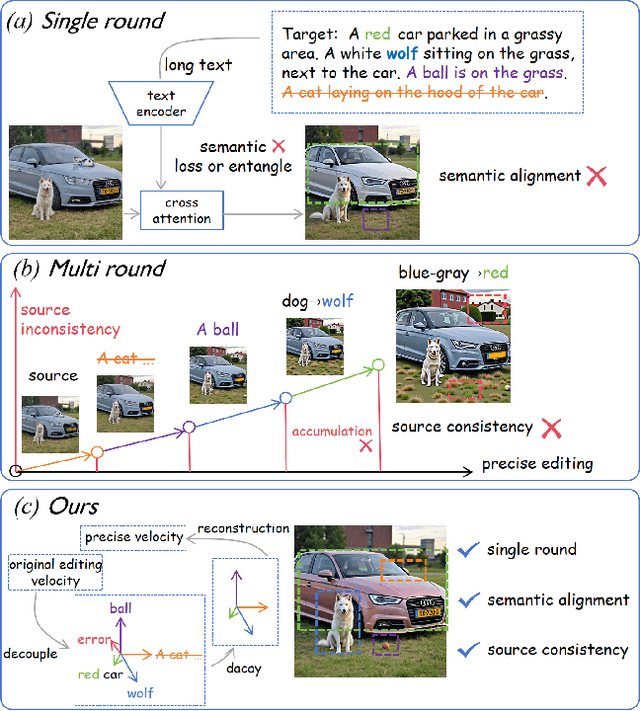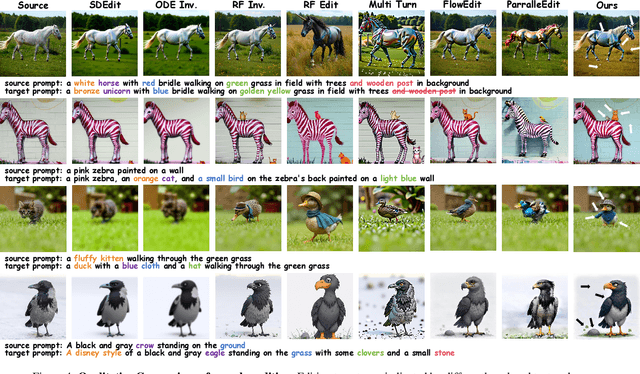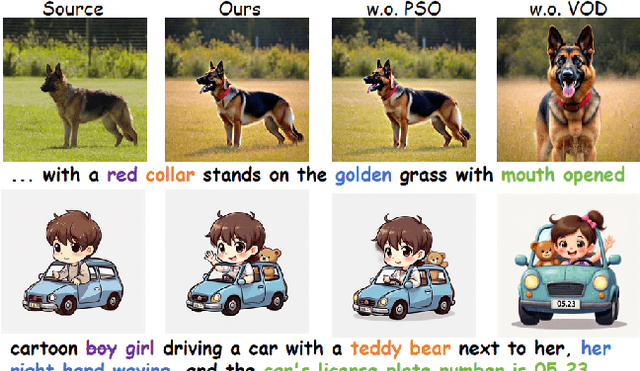Yanghao Wang
FlowDC: Flow-Based Decoupling-Decay for Complex Image Editing
Dec 12, 2025



Abstract:With the surge of pre-trained text-to-image flow matching models, text-based image editing performance has gained remarkable improvement, especially for \underline{simple editing} that only contains a single editing target. To satisfy the exploding editing requirements, the \underline{complex editing} which contains multiple editing targets has posed as a more challenging task. However, current complex editing solutions: single-round and multi-round editing are limited by long text following and cumulative inconsistency, respectively. Thus, they struggle to strike a balance between semantic alignment and source consistency. In this paper, we propose \textbf{FlowDC}, which decouples the complex editing into multiple sub-editing effects and superposes them in parallel during the editing process. Meanwhile, we observed that the velocity quantity that is orthogonal to the editing displacement harms the source structure preserving. Thus, we decompose the velocity and decay the orthogonal part for better source consistency. To evaluate the effectiveness of complex editing settings, we construct a complex editing benchmark: Complex-PIE-Bench. On two benchmarks, FlowDC shows superior results compared with existing methods. We also detail the ablations of our module designs.
Exploring Cross-Modal Flows for Few-Shot Learning
Oct 16, 2025Abstract:Aligning features from different modalities, is one of the most fundamental challenges for cross-modal tasks. Although pre-trained vision-language models can achieve a general alignment between image and text, they often require parameter-efficient fine-tuning (PEFT) for further adjustment. Today's PEFT methods (e.g., prompt tuning, LoRA-based, or adapter-based) always selectively fine-tune a subset of parameters, which can slightly adjust either visual or textual features, and avoid overfitting. In this paper, we are the first to highlight that all existing PEFT methods perform one-step adjustment. It is insufficient for complex (or difficult) datasets, where features of different modalities are highly entangled. To this end, we propose the first model-agnostic multi-step adjustment approach by learning a cross-modal velocity field: Flow Matching Alignment (FMA). Specifically, to ensure the correspondence between categories during training, we first utilize a fixed coupling strategy. Then, we propose a noise augmentation strategy to alleviate the data scarcity issue. Finally, we design an early-stopping solver, which terminates the transformation process earlier, improving both efficiency and accuracy. Compared with one-step PEFT methods, FMA has the multi-step rectification ability to achieve more precise and robust alignment. Extensive results have demonstrated that FMA can consistently yield significant performance gains across various benchmarks and backbones, particularly on challenging datasets.
Improving Diffusion-based Data Augmentation with Inversion Spherical Interpolation
Aug 29, 2024Abstract:Data Augmentation (DA), \ie, synthesizing faithful and diverse samples to expand the original training set, is a prevalent and effective strategy to improve various visual recognition tasks. With the powerful image generation ability, diffusion-based DA has shown strong performance gains on different benchmarks. In this paper, we analyze today's diffusion-based DA methods, and argue that they cannot take account of both faithfulness and diversity, which are two critical keys for generating high-quality samples and boosting final classification performance. To this end, we propose a novel Diffusion-based Inversion Interpolation DA method: Diff-II. Specifically, Diff-II consists of three main steps: 1) Category concepts learning: Learning concept embeddings for each category. 2) Inversion interpolation: Calculating the inversion for each image, and conducting spherical interpolation for two randomly sampled inversions from the same category. 3) Two-stage denoising: Using different prompts to generate synthesized images in a coarse-to-fine manner. Extensive experiments on multiple image classification tasks (\eg, few-shot, long-tailed, and out-of-distribution classification) have demonstrated its effectiveness over state-of-the-art diffusion-based DA methods.
Random Boxes Are Open-world Object Detectors
Jul 17, 2023



Abstract:We show that classifiers trained with random region proposals achieve state-of-the-art Open-world Object Detection (OWOD): they can not only maintain the accuracy of the known objects (w/ training labels), but also considerably improve the recall of unknown ones (w/o training labels). Specifically, we propose RandBox, a Fast R-CNN based architecture trained on random proposals at each training iteration, surpassing existing Faster R-CNN and Transformer based OWOD. Its effectiveness stems from the following two benefits introduced by randomness. First, as the randomization is independent of the distribution of the limited known objects, the random proposals become the instrumental variable that prevents the training from being confounded by the known objects. Second, the unbiased training encourages more proposal explorations by using our proposed matching score that does not penalize the random proposals whose prediction scores do not match the known objects. On two benchmarks: Pascal-VOC/MS-COCO and LVIS, RandBox significantly outperforms the previous state-of-the-art in all metrics. We also detail the ablations on randomization and loss designs. Codes are available at https://github.com/scuwyh2000/RandBox.
 Add to Chrome
Add to Chrome Add to Firefox
Add to Firefox Add to Edge
Add to Edge